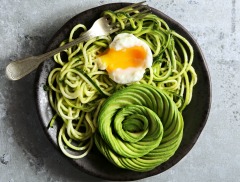Don't just meal plan... meal plan intelligently - with Meal Genius! Sign up for our free newsletter to get delicious recipes, sample meal plans and a whole lot more!
Tea, Herbal
Despite its name, herbal tea is not actually a true tea like green tea or black tea made from the leaves of Camellia sinensis. Instead, it is a mixture of seeds, leaves, spices, bark, and/or root that is steeped in water to release flavors and healing properties.
Since the ingredients are from a variety of plant sources not related to tea or coffee, herbal teas are predominately caffeine-free and offer an alternative uses. Popular herbal teas include peppermint tea for stomach relief, chamomile tea for calming and insomnia, and Rooibos, a red tea that has antioxidant properties that fight disease.
The Benefits
- Special diets: Autoimmune Paleo Diet, Elimination Diet, Gluten-Free Diet, Gluten-Free/Dairy-Free Diet, Grain-Free Diet, Low Acid Diet, Low FODMAP Diet, Low Histamine Diet, Low Oxalate Diet, Low Starch Diet, Paleo Diet (Light), Paleo Diet (Strict), Pescetarian Diet, Primal Diet, Vegetarian Diet, Whole Food
- Excellent Source of:
- Good Source of:
- Preferences: No Fish, No Red Meat, No Pork, No Eggs, No Shellfish, No Gluten, No Nuts, No Seeds, No Soy, No Dairy, No Poultry, No Corn, No Yeast, No Peanuts, No Grains, No Molds, No Legumes, No Nightshade, No Citrus, No Coconut, No Pseudograins, Low Carbohydrate, Low Cholesterol, Low Fat, Low Sodium, Low Sugars, Low Saturated Fat
Related Foods
Selecting and Storing









